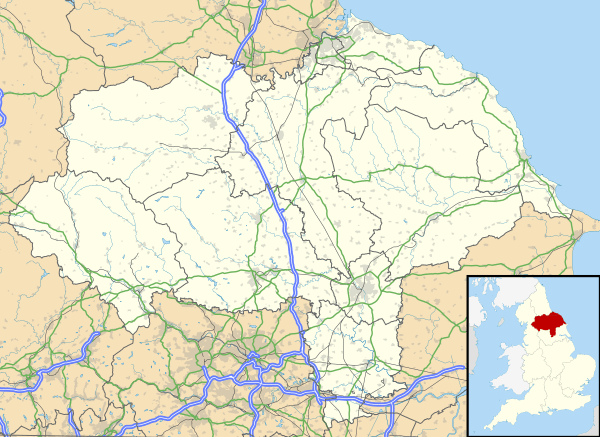Thornton Watlass
Thornton Watlass is a small village and civil parish within the Hambleton district of North Yorkshire, England. It is located north of Masham and south of Bedale on the eastern slopes of the Ure Valley at the entrance to Wensleydale and the Yorkshire Dales National Park.[2] It is 11 miles North of Ripon, 4 miles from the A1, 11 miles from the main railway line at Northallerton and 18 miles from Teesside Airport.[3] Its population was 180 in 2000, 190 in 2005, 224 in 2011 and 240 in 2016.[1]
| Thornton Watlass | |
|---|---|
Nov2006.jpg) Looking east across Thornton Watlass village green | |
 Thornton Watlass Location within North Yorkshire | |
| Population | 240 (2016 estimate)[1] |
| OS grid reference | SE235855 |
| District | |
| Shire county | |
| Region | |
| Country | England |
| Sovereign state | United Kingdom |
| Post town | RIPON |
| Postcode district | HG4 |
| Dialling code | 01677 |
| Police | North Yorkshire |
| Fire | North Yorkshire |
| Ambulance | Yorkshire |
The village lies at the junction of Watlass Lane and Watlass Moor Lane. At the centre of the village is the triangular village green with its trees, cricket pitch and children's playground, surrounded by houses, some of which are built from local stone. Thornton Watlass Church dates from the 11th century and the village also has a primary school and a public house called the Buck Inn. The village forms part of the Thornton Watlass Estate, and Thornton Watlass Hall, an ancient two-storey gabled stone house, lies just to the north of the village.
History
Aug2005.jpg)
A prehistoric feature in the Thornton Watlass area is Gospel Hill tumulus, a Scheduled Ancient Monument, at grid reference SE228862 about 1 km northwest of the village. The site of the priory is now a scheduled ancient monument.[4]
Saxon remains of two cross-heads[5] are evidence that people lived in the area before the Norman conquest in 1066. They are on display in Thornton Watlass Church.
The Domesday book of 1086 mentions the separate villages of Thornton and Watlass.[6] Before the Norman conquest the Saxon owners of these villages were Ulward and Stan; however, Thornton is shown in the Domesday book as being owned by Ribald, brother of Alan Earl of Richmond. Thornton Watlass Hall and estate has been owned by the Dodsworth family since 1415.
The Anglican Church of St Mary the Virgin stands a little way outside the village to the southwest. It was rebuilt, with the exception of the tower, in 1868 in the Perpendicular style.[7] The tower contains some living accommodation (including toilet) and was probably used as a place of safety in times of strife.
The village school was built in 1872.[7]
Thornton Watlass today
Today the village has about fifty houses and a few farms,[8] with a population of 222 at the 2011 Census.[9]
The Church of England primary school is federated with Snape Community School and had 41 children on the roll in 2007 aged between 4 and 11 years, taught in two mixed-age classes. By 2016, the pupil numbers had dropped to 25.[10]
There is also provision for under-5s in the village hall.
The village public house, restaurant and hotel, The Buck Inn[11] overlooks the village green. Specialities include locally brewed real ale, Sunday lunchtime jazz, and a large room for conferences and functions.
Just to the north of the village, Thornton Watlass Hall is a private home, but also provides hotel accommodation.[3] The Hall has been featured over the years on several television dramas, including All Creatures Great and Small (BBC), Wuthering Heights (ITV) and Heartbeat (ITV) where it has featured as Ashfordly Hall and Websters Hotel for the past nine years.
References
- "2015 Population Estimates" (PDF). northyorks.gov.uk. December 2016. p. 12. Retrieved 27 July 2017.
- Cally (2007). "Buck Inn". A1 Tourism. Retrieved 15 April 2007.
- "Thornton Watlass Hall - Ripon". iKnow Yorkshire. Archived from the original on 3 April 2007. Retrieved 15 April 2007.
- Historic England. "Round barrow known as Gospel Hill, 80m south west of Pasture House (1018922)". National Heritage List for England. Retrieved 23 October 2017.
- Chris Tolley (2003). "Thornton Watlass (North Yorkshire)". Crossing the Millennia. Archived from the original on 6 February 2007. Retrieved 15 April 2007.
- Sir John Smith-Dodsworth, Bt (1987). "History". Thornton Watlass Hall. Archived from the original on 6 March 2005. Retrieved 15 April 2007.
- Colin Hinson (2007). "Thornton Watlass: Geographical and Historical information from the year 1890, from Bulmer's History and Directory of North Yorkshire (1890)". GENUKI. Retrieved 16 April 2007.
- "Thornton Watlass" (PDF). colinday.co.uk. Retrieved 3 February 2020.
- UK Census (2011). "Local Area Report – Thornton Watlass Parish (E04007284)". Nomis. Office for National Statistics. Retrieved 3 February 2020.
- "Thornton Watlass Church of England Primary School". reports.ofsted.gov.uk. 5 November 2010. Retrieved 27 July 2017.
- Tim Wright (2005). "The Buck Inn". Archived from the original on 28 June 2007. Retrieved 16 April 2007.